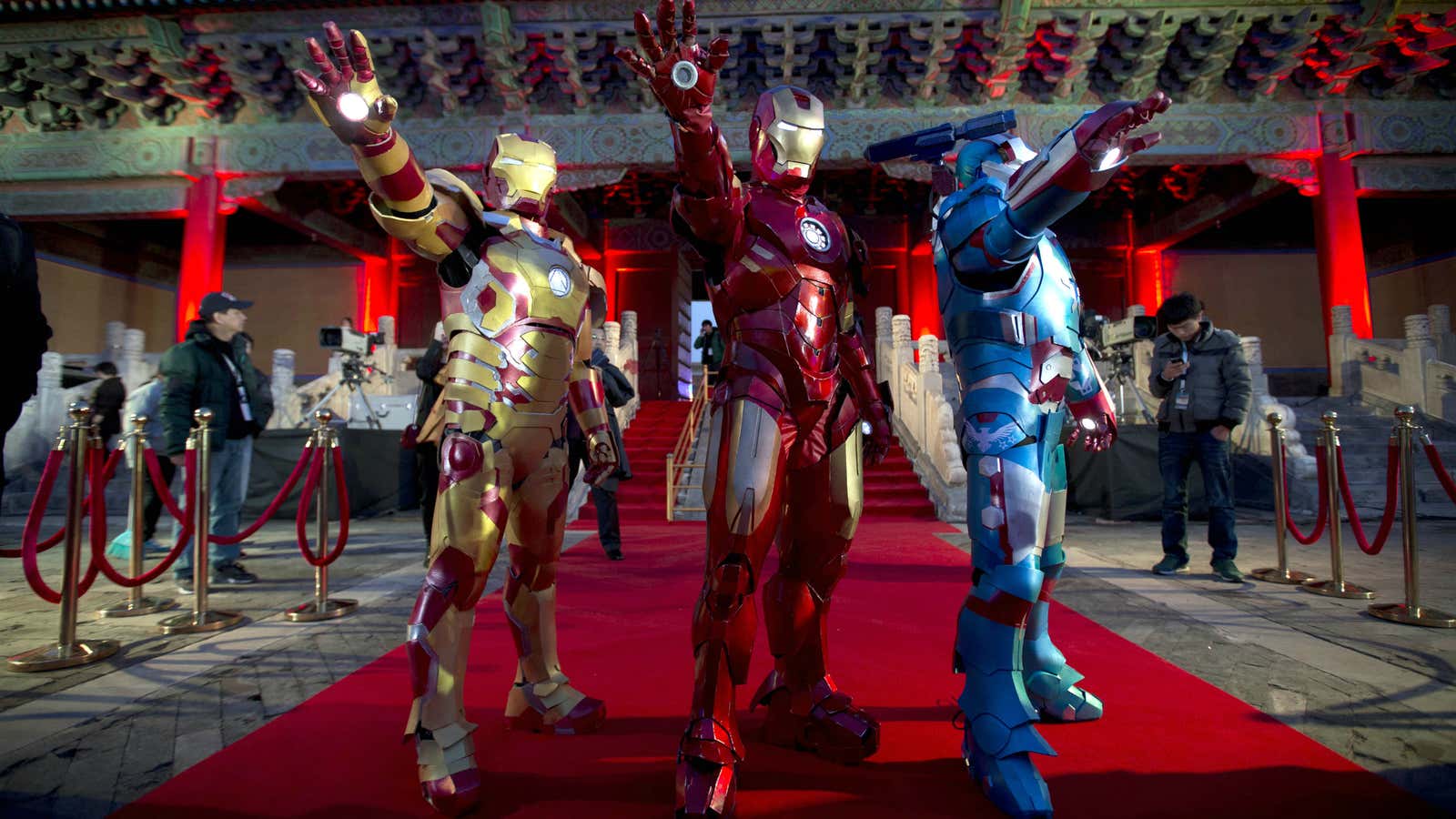Foreign movie makers are scrambling over each other to make movies that appeal to Chinese audiences. That’s fair enough—it’s now the world’s second biggest movie market after the US, worth $2.7 billion, and a report last year by Ernst and Young projected that its movie audience would surpass all others by 2020.
But the usual Hollywood crowd-pleasing formulas do not necessarily apply. And before movie makers can get their movies in the theaters, there are numerous hoops to jump through too, like securing joint financing, finding a studio partner and especially placating China’s notoriously prickly censors.
Rule 1: None of that mushy stuff
Chinese audiences have a prickly attitude towards vulnerable women, according to South Korean movie maker Oh Ki-hwan, who re-filmed his 2001 romantic tea-jerker Last Present for a Chinese audience. He found a Chinese studio to team up with, but told the Wall Street Journal that he almost had to start again on the story. The female protagonist was unrealistic, according to his new partners. “It was hard to find a wife like her—ever sacrificing and tolerant of her financially inept spouse—in China,” said Oh. He had her say “I love you” to her partner in the original script, but was told he should remove the line. “According to them, it’s not something an average woman from mainland China—whom they described as strong and level-headed—would say in that situation.”
Rule 2: Not even alien robots are allowed to destroy national landmarks
The producers of the much-anticipated sci-fi robo-flick Transformers 4 have done their level best to promote the film to a Chinese audience, even casting Chinese actors and filming in Beijing. But they came under fire from netizens for rumors that the Pangu Plaza and other national landmarks might end up exploding in a cloud of debris, as sets in previous Transformers movies have been wont to do. The studio moved quickly to quell the speculation.
Rule 3: The Chinese government doesn’t cover up zombie outbreaks
An early version of the current box-office hit World War Z, which features Brad Pitt in the middle of a zombie apocalypse, was initially rejected by Chinese censors. The book the movie was based on had the zombie outbreak start in China, where it was covered up by the government, leading to a global catastrophe. In the final censor-approved version, the outbreak started in Russia.
Rule 4: Torture is ok, genitals are not
Quentin Tarantino’s violent western Django Unchained opened a month late in China after censors shut the film down only minutes into its premiere screening. The director had already re-edited the movie to tone down the violence, including making the copious fake blood a darker color, with less splatter. But he neglected to trim a scene in the movie where viewers can clearly discern the genitals of the movie’s titular star, Jamie Foxx, as he is threatened with castration.
Rule 5: Social commentary is a no-no
Super gadgets, aliens, cowboys and zombies are all ok, but Chinese censors are really unhappy when a movie tries to tackle social issues. At a film festival in Beijing last year, organizers were warned not to show a film called Egg and Stone, which was about sexual abuse in a rural family. They refused, and half way through the showing, power to the theater was abruptly cut. Some guests said they were followed by unidentified men after the event, who asked them why they had been there.
Rule 6: A bit of subtle promotion helps open some doors…
Foreign producers are acutely aware that getting past the censors is only part of the problem. China only accepts 34 foreign movies every year, and they all have to have a minimum number of Chinese actors. A Chinese film studio partner or Chinese financing helps with the process, but these can be difficult to find and picky about content. DMG Entertainment joined with Hollywood’s Endgame Entertainment to produce and finance the dystopian sci-fi flick Looper, which added scenes set in Shanghai to help secure its China release. A character even says at one point: “I’m from the future: You should go to China.”
Rule 7: …but pandering to the audience won’t put butts in seats
For all their efforts, Looper’s producers failed to win over Chinese film buffs with their product country placement. The Chinese version of Iron Man 3 had a similar problem. Its crew added extra scenes and Chinese characters, and even featured protagonist Tony Stark flying all the way to China for an operation, because it offered the best medical care. Chinese film-goers jeered at the clumsy added scenes.




